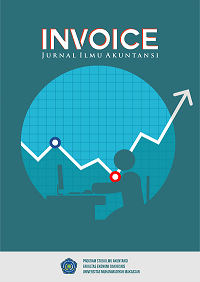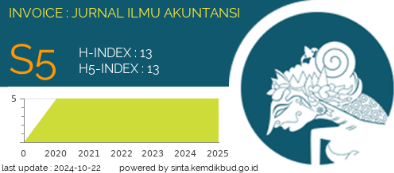PENGGUNAAN TEKNOLOGI INFORMASI TERHADAP KINERJA KEUANGAN PADA PT PLN (PERSERO) AREA MAKASSAR SELATAN
DOI: https://doi.org/10.26618/inv.v1i1.2018
Abstrak
This study aims to determine the effect of the use of information technology on financial performance at PT. PLN (Persero) South Makassar Area. This type of research is an empirical research method of collecting data using a questionnaire with a sample of 32 respondents of PT. PLN south Makassar area. Data analysis using multiple regression analysis techniques with SPSS software is used to test the research hypothesis. The results showed that the simultaneous use of information technology had a significant effect on financial performance. The use of information technology persistently affects financial performance.This study aims to determine the effect of the use of information technology on financial performance at PT. PLN (Persero) South Makassar Area. This type of research is an empirical research method of collecting data using a questionnaire with a sample of 32 respondents of PT. PLN south Makassar area. Data analysis using multiple regression analysis techniques with SPSS software is used to test the research hypothesis. The results showed that the simultaneous use of information technology had a significant effect on financial performance. The use of information technology persistently affects financial performance.Referensi
Amin, Muh, Al. Pengaruh Kualitas Informasi danKualitas teknologi Informasi Terhadap Kinerja Keuangan Dengan Mediasi Kepuasan Penguna Sistem . 2004: 1-19.
Aufar , Arizal. “Faktor-Faktor Yang Mempengaruhi Pengunaan Informasi Akutansi Pada Umkm (Survei Pada Perushaan Rekanan PT Pln (Persero) Di Kota Bandung”, Skripsi. Bandung: Fakultas Ekonomi Universitas Widytatama, 2013.
Azhar, Susanto. teknologi Informasi Akutansi, Struktur – Pengendalian – Resiko – Pengembangan, ed. Perdana, Cetakan Pertama, Lingga Jaya: Bandung, 2008.
Bodnar, George H, & Hopwood, William S. Accounting Informasi System, Tenth Edition, Pearson Education inc. Upper Saddle River, New Jesrey.2010.
Davis, F.D. Perceived Usefullness, Perceived Ease of Use, and Acceptance of Information Sistem Technology. MIS Quartetly, Vol.13 N0.3, (1989): h.319-339.
Delone, W. H., and Mclean E. R. Information System Success: The Quest for the Dependent Variable, Information System Research, 3(1):1992, h60-95.
Delone, W. H., and Mclean, E. R. The Delone Mclean Model of Information system Success: A ten- Year Update, Journal of Management Information, Vol. 19, No. 4: (1992): h.9-30.
Doll, W.J., and Torkzadeh, G.The Measurement of End User Computing Satisfaction, MISS Quartely, 12(2): 159-174.13
Doll, W.J., Xia, W., and Torkzadeh, G. 1994. A Conformatory Factor Aalysis of the end-user Computing Satisfaction Instrument, MIS Quartely, 12(2): 1988, h.159-174.
Goodhue, D.L., and Thompson R.L. Task- Technology Fit and Individual Performance, MIS Quartely, 19(2): 1995: h.213-236.
Guimaraes, T., M. Igbaria, and M. Lu.The Termianants of DSS success: An integrated model. Decision Sciences 23, no. 2: 1992: h. 409-430.
Hasan, Tholhah, Muhammad. Islam dan Masalah Sumber Daya Manusia. Jakarta: Lantabora Press. 2005.
Iranto, Dwi Bondan. “Pengaruh Kepuasan Penguna teknologi Informasi TErhadap Kinerja Individu (Studi pada PT. PLN Persero Distribusi |Jawa Tengah dan DIY)”.Skripsi.Semarang: Fakultas Ekonomika dan Bisnis Universitas Diponegoro, 2012.
Istianingsih, dan S.H. Wijayanto.Pengaruh Kualitas Teknologi Informasi, Perceived Usefullness, dan Kualitas Informasi Terhadap Kepuasan Penguna Akhir Software Akutansi.Pontianak: Simposium Nasional Akutansi XI, 2008. H. 1-15. 2008.
McGill, Tanya Hobbs Valerie, & Klobas Jane. User-Developed Applications and Information System Success: a Test of Delone and Mclean’s Model, Information Research Management Journal, 16(1): 2003, h. 24-45.
Montazemi, A.R., Factor afecting information satisfaction in the context of the small business environment. MISS Quartely, Vol 12(2): 1988, h. 239-256.
Myers, Barry L, Kappelman Leon A. & Prybutok, Victor.R.A Comperhensive Model for Assesing the Quality of the Information System Funtion: Toward a Theory for Information system Assesment, Information Resource Management Journal Winter, 10(1):2007, h. 6-25.
Rahim, A. R., Rasulong, I., Jusriadi, E., & Adzim, F. (2016). STRATEGI IMPLEMENTASI MODEL PENGEMBANGAN WIRAUSAHAWAN MUDA BAGI MASYARAKAT PESISIR KABUPATEN TAKALAR. Balance, 14(02).
Rahman, A., & Rasulong, I. (2015). Empowerment of Creative Economy to Improve Community Incomes in Takalar Regency. IOSR Journal of Business and ManagementVer, 17(4), 2319-7668.
Rasulong, Ismail. "PEMAHAMAN NASABAH TENTANG KONSEP MUDHARABAH (Studi Pada BMT Ditha Anugerah Abadi Makassar)." Jurnal Ekonomi Balance 7.1 (2011): 32-42.
Rasulong, Ismail. "PEMAHAMAN NASABAH TENTANG KONSEP MUDHARABAH (Studi Pada BMT Ditha Anugerah Abadi Makassar)." Jurnal Ekonomi Balance 7.1 (2011): 32-42.
Sugiyono. 2015. Metode Penelitian Administrasi. Bandung: CV. ALFABETA
Soemarso, “ Akutansi, Suatu Pangantar, Jilid 1”. Jakarta: Salemba Empat. 2004.
Unduhan
Diterbitkan
Terbitan
Bagian
Lisensi
Authors who publish with Invoice: Jurnal Ilmu Akuntansi agree to the following terms:
-
Copyright Ownership
The copyright of all articles published in this journal remains with the author(s). However, the authors grant Invoice: Jurnal Ilmu Akuntansi the right of first publication with the work simultaneously licensed under a Creative Commons Attribution 4.0 International License (CC BY 4.0). This license allows others to share, copy, redistribute, adapt, and build upon the work for any purpose, even commercially, as long as proper credit is given to the original author(s) and the source. -
Licensing and Access
Invoice: Jurnal Ilmu Akuntansi provides immediate open access to its content on the principle that making research freely available to the public supports a greater global exchange of knowledge. All published materials are available freely without subscription or payment and can be accessed, downloaded, and reused by any user provided that appropriate attribution is given. -
Permission for Reuse
For uses not covered by the CC BY 4.0 license, such as commercial reprints, translations, or any form of adaptation without clear attribution, users must obtain written permission from the editorial team. Requests for such permissions can be directed to the editorial office at: [invoice@unismuh.ac.id]. -
Plagiarism and Originality
Authors are responsible for the originality of their submissions. All articles are screened for plagiarism using appropriate tools before acceptance. Manuscripts found to contain unoriginal content or infringing materials will be rejected or retracted as per journal policy.














